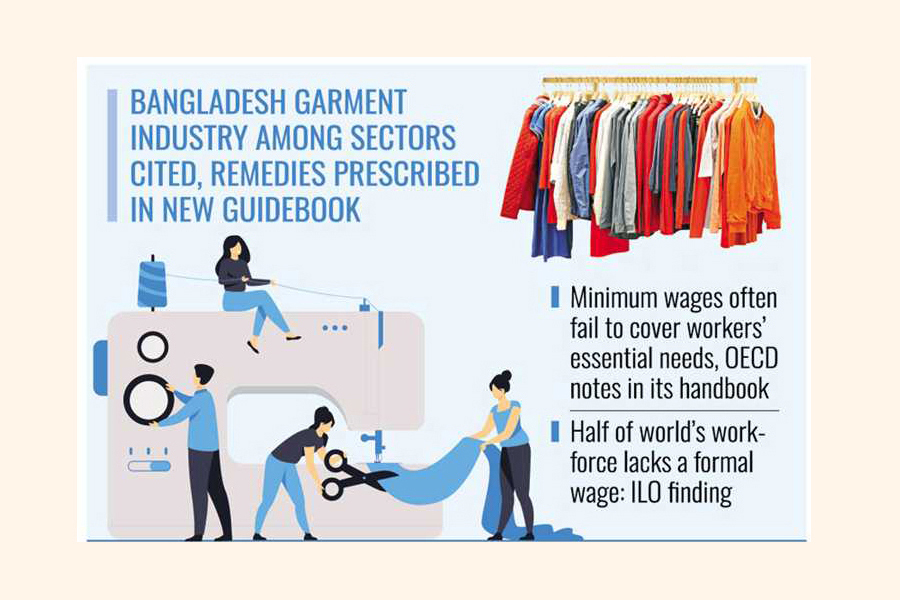
Published :
Updated :

A new guideline of the Organisation for Economic Co-operation and Development (OECD) asks companies to apply its due-diligence framework to support living incomes and wages in the global supply chains to avert impending backlash.
The OECD handbook, published on October 16, focuses on agriculture, garment and footwear sectors where inadequate incomes and wages are often identified as prevalent risks.
Globally, millions of workers earn below living-income and -wage estimations, exposing them to poverty and other human-rights risks, as minimum wages despite being set by governments to prevent exploitation, often fail to cover essential needs, the OECD notes in its publication.
According to the ILO estimation, half the world's workforce lacks a formal wage, particularly small-holders and home workers. In agriculture, low wages, compounded by factors such as seasonal labour and lack of protections, contribute to precarious working conditions.
In the garment sector, factors including high competition and poor purchasing practices by downstream buyers, which increase the likelihood of excessive overtime and insecure contracts, can contribute to wages below the poverty line, according to the International Labour Organisation.
Recently, the ILO denoted the concept of a living wage to the wage level that is necessary to afford a decent standard of living for workers and their families, taking into account the country circumstances and calculated for the work performed during the normal hours of work.
Citing examples, the OECD handbook says workers, trade unions and workers' representatives have been in protests, strikes and negotiations for wage raises in Bangladesh, Cambodia and Myanmar.
Workers are increasingly contesting irresponsible disengagement without adequate wage payment or severance pay such as during the COVID-19 pandemic with the use of Force Majeure clauses and in times of economic slowdown and demand drops.
The OECD, an international organisation with 38 member -countries, says the handbook can assist companies in determining whether they are linked to significant risks and impacts related to living incomes and wages and in responding to such impacts.
"Where such risks are identified, it supports them in addressing these impacts, regardless of the company's size, geographic location or position within the supply chain," the handbook reads.
The industrial guidebook has outlined six steps that illustrate how due diligence could help companies address living -income-and wage gaps in their operations and supply chains.
Among the steps are embedding living-income and living-wages due diligence into policies and management systems, identifying and assessing living income-and living- wages gaps and impacts in own operations and supply chains.
It suggests ceasing, preventing and mitigating living -income and living-wages gaps, providing for or cooperating in remediation when appropriate and communicating commitments and actions taken to address the gaps and tracking implementation and results.
The book also mentions that bilateral engagement between buyers and suppliers may not be sufficient to increase access to a living income and living wages.
Citing an example, the book says it may be difficult for an individual company to ensure that a supplier pays a living wage if the company only uses a fraction of the supplier's production capacity.
"Working with other buyers, individually or through industry initiatives and agreements, is therefore often a necessary component of a company's living income and living wage due diligence to this can also lead to synergies and harmonisation of buyer requirements, reduced costs, joint government engagement and increasing buyer leverage."
Munni_fe@yahoo.com


 For all latest news, follow The Financial Express Google News channel.
For all latest news, follow The Financial Express Google News channel.